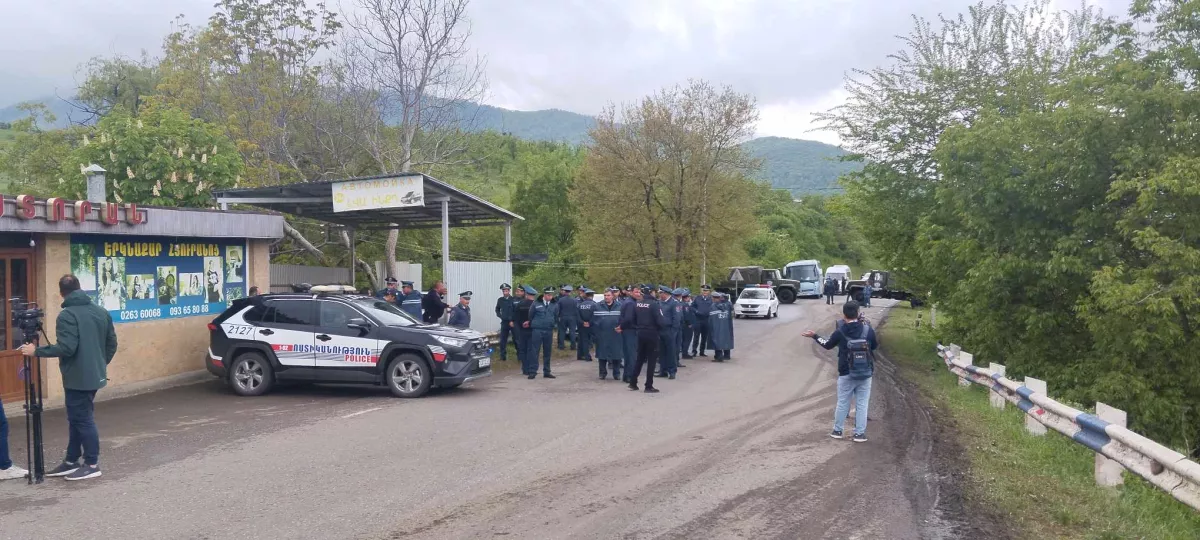German media’s biased Armenia-Azerbaijan coverage reveals shift from neutrality Fact-checking lags behind
A new trend has emerged in Western journalism: a genre of sympathetic essays highlighting the "long-suffering" Armenia and its "ordinary citizens". Recently, Frankfurter Allgemeine Zeitung, a major German newspaper with a global readership, featured an article titled "How Azerbaijan pressures Armenia."

The article begins by immersing readers in a narrative of "profound distress".
Othmara Glas, the author, writes: "Armenia and Azerbaijan are in peace talks, and borders are being redrawn. This has had severe effects on the Armenian mountain village of Kirants (Guney - Ed.). A tall, three-meter-high grey concrete wall now stands in front of Kirants’ school, meant to protect the children. Yet, parents in this village live in fear, worrying that Azerbaijani border guards might shoot at their children while they play in the schoolyard. Since April, the village borders the nation that attacked Armenia last autumn."
It must be noted that the article in question is rife with inaccuracies, similar to those found in the opening paragraph. While addressing every erroneous detail would be excessive, it is worth highlighting one specific point that reflects both the emotional bias and professional shortcomings of the author.
The article states, “Since April it (the village) has been on the border with the country that attacked Armenia last autumn.”
In reality, Azerbaijan did not attack Armenia last autumn. Instead, Azerbaijan completed the restoration of its sovereignty over the Karabakh region, which has been internationally recognized, including by Germany. This misrepresentation not only shows the author's emotional partiality towards Armenians but also a deliberate distortion of facts. It’s possible that the journalist, Othmara Glas, is simply echoing the Armenian narrative without verifying the facts, a clear indicator of professional inadequacy.
Although Wikipedia describes Frankfurter Allgemeine Zeitung as known for its "qualitative analysis of political and economic national and international events," it seems this reputation may not be upheld in this instance. This discrepancy suggests either a lack of understanding of the subject matter by researchers or a deliberate decision by the newspaper to undermine its own credibility. European perspectives, often detached from global conflicts, may lead to a superficial or biased interpretation of events, particularly when reporting on complex issues involving Muslims and Christians. This trend reflects a broader issue where distant conflicts are often treated with less scrutiny, as long as the coverage is polished and compelling.
The central theme of Glas's article is the portrayal of border negotiations between Azerbaijan and Armenia as a discriminatory process, with “aggressive Azerbaijan” unfairly taking land from the “small and weak” Armenia.

From this perspective, the article's author reveals a glaring contradiction. Azerbaijan has a vast stretch of its border with Armenia that remains undelimited. It begs the question: why would Azerbaijanis target a specific village like Kirants, especially if they have already achieved their objectives? According to the narrative of suffering Armenians and the sympathetic German journalists, these areas should logically be the most secure along the entire border.
Yet, delving into the specifics is not the focus here.
A more pressing issue arises: whose agenda is this "independent" newspaper advancing? Is Germany, which maintained a neutral stance for three years post-war, now aligning with American-French interests? The question is undeniably complex. However, the recent emergence of German-made armaments in Armenia presents a troubling scenario, prompting serious questions about Germany’s current stance. Traditionally a neutral player, Germany has recently hosted negotiations in Munich and Berlin, but this shift in its involvement suggests it might be moving away from its historically neutral position.
This shift could be indicative of broader trends where historical biases and external pressures influence policy decisions.
To lighten the mood, let's revisit a few more passages from the article, which offer a touch of humour:
"This situation puts a lot of psychological stress on her (the heroine of the story - Ed.), she doesn't sleep well and can't concentrate. She hasn't finished the book in months."
Indeed, it's a sobering thought to imagine the global consequences if this Armenian girl fails to complete her book.

Sixty-five-year-old Samvel, seated on a bench beneath a tree, shares his concern.
“How can one feel safe with such neighbours?” he questions. “If Germany or France were bordering Armenia, things might be different. But Azerbaijan and Türkiye?” He slowly shakes his head.
While Samvel’s fears are understandable, a more informed journalist might have recalled the historical conflicts like the battle of Verdun and the disputes over Alsace and Lorraine when assessing the situation.
In conclusion, the portrayal of Azerbaijanis in the text leans towards depicting them as something between wolves and brigands.
Well, let them be afraid.








